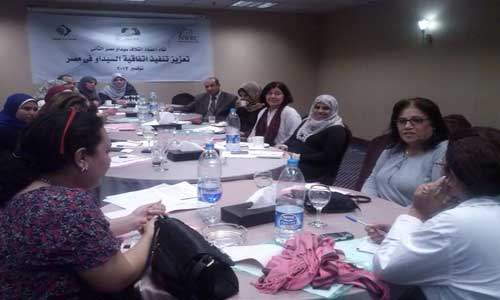Youth and gender
The human resources is the top of the EACD priority and the most of them are the youth, as they are need to have care and attention .
All the modern social science and humanity studies of
On the other hand officials confirm equal opportunity principle through the ratification of International and Arab conventions related to human rights and participation in conferences related to woman rights.
 Egypt has made progress toward meeting the conventions’ goals with regards to legal and social inequality. Some substantial legal reforms concerning the status of women have been undertaken, but gender inequality persists in Egyptian society.
Egypt has made progress toward meeting the conventions’ goals with regards to legal and social inequality. Some substantial legal reforms concerning the status of women have been undertaken, but gender inequality persists in Egyptian society.
In spite of the significance and appreciation of women role in society being a mother, sister or wife, a tacit concept governed by customs and traditions classifies women in a lower grade than men which leads to humiliation, non productivity and prevent innovation.
Objectives
Women play a great role in comprehensive development process. By investing their skills and capabilities, EACD is convinced to boost the entire development process and to invest all resources of the local communities.
In all of its programs (economic, education, health), the association is giving a distinctive place for women to reinforce and give them the opportunity to express themselves and to represent their society.
General objective
Through formation of feminine leadership, EACD aims to promote women's empowerment and engagement in social development for them to play a positive and effective role in the Society.
Specific objectives:
- Incitation of achievement and self esteem for women resident in activities’ locations to back the objective of male/female communal head formation.
- Decrease gender discrimination inherited through customs and traditions.
- Women’ promotion and empowerment to play a greater role inside the civil society.
Gender Awareness
With the women
The beneficiaries are provided with extensive sessions to empower their personalities and abilities, as well as to strengthen them to take active actions in their communities.
This helps them to understand and obtain their rights as citizens and reduces gender gap. This also draws attention of their community, other organizations and the policy makers in their area.
These sessions include the following subjects:
- Women’s rights
- Legal awareness - expanding civic and political participation.
- Elements affecting social order.
- Health awareness - advancing health and reproductive rights.
- Job specification according to gender.
- Social discrimination
With other stakeholders
EACD manages monthly meetings run and attended by specialists in development work and development studies, local authority representatives and board directors’ members from local associations.
This is for raising public consensus in local community to take attempts and to start projects to empower women among the local communities.
EACD attends also meetings and training sessions organized by the National Council for Women, the Arab Women League and the national network regrouping NGOs working in gender issue.
The Association also organizes monthly meetings with specialists in development work and development studies, local authority representatives and directors from local associations. This triggers a public consensus in local communities about taking initiative and starting projects that empower women in these areas. Furthermore the EACD attends meetings and training sessions organized by the National Council for Women and the Arab Women Organization (AWO).
Publication of flyers and video films
Publishing of documentation to be available for local NGOs willing to work in gender issue.
Network for Women's Rights Organizations (NWRO)
In 2008 the EACD joined 9 other Egyptian organizations formed the Network for Women’s Rights Organizations in Egypt (NWRO). The network is working in the field of women and family rights. It was formed in 2005 as an initiative to build a shared vision and a framework for joint action among member organizations concerned with family rights. In its initial phase, NWRO paid special attention to the implications and consequences of informal marriage practices in Egypt on women and children. It focused mainly on advocacy, research, direct support, awareness-raising and capacity-building. At present, it focuses on contributing to the enactment of a new and more equitable Family Law that addresses the needs of all Egyptians, women and men alike. NWRO looks forward to establish a sustainable framework of joint work which caters to women’s issues and society at large.
Each participating organization is responsible for ascertaining these needs within certain geographical areas of Egypt, while generating support for the law within these local communities. EACD responsible to implement these activities in Cairo, Assiut and Fayoum.
The network has assigned a variety of tasks to each of its member organizations according to a timeline that extends into the year 2010. Thus far, the Network has:
- Developed Personal law guide supported by Muslim and Christian religious figures and scholars.
- Organized 14 consensus-building meetings with local CDAs, syndicates, labor unions, members of parliament and local councils. EACD was responsible for 2 of these.
- Organized meetings with national organizations, including the National Council for Women, the Ministry of Justice and the National Council for Childhood and Motherhood.
- Gathered support from community members who would be affected by the new law.
- Gathered proposals from governmental and non-governmental organizations regarding the contents of the law.
- Organized round tables with judges, religious figures and members of parliament who could provide the law with additional support. EACD was responsible for 2 of these.
- Organized awareness seminars all over Egypt. EACD was responsible for 3 of these.
- Sponsored promotional activities such as theater plays, films and story-telling events.
- Provided community-based legal support to women and their families.
- Conducted research on women’s opinions about the law.
- Conducted comparative research on personal status laws in other Arab and Muslim countries.
- Published promotional materials, such as a brochure, a poster and a calendar.
